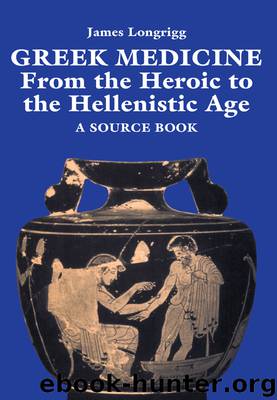Greek Medicine by Longrigg James

Author:Longrigg, James
Language: eng
Format: epub
ISBN: 978-1-136-78218-3
Publisher: Taylor & Francis (CAM)
THE ATHENIAN PLAGUE
In the early summer of the second year of the Peloponnesian War (430 BC) the Lacedaimonians again invaded Attica and laid waste to the countryside, whose inhabitants had taken refuge within the Long Walls. Athens had consequently become seriously overcrowded. A few days after the invasion the Plague broke out — killing, it would appear,about one third of the population of the city. The impact of the disease upon Athens is described by the historian Thucydides in the second book of his History of the Peloponnesian War . He provides our only contemporary account, which has become a literary model for descriptions of plague by many subsequent authors [see, for example, X.7]. He himself fell victim to the disease. His rational detailed account of its symptoms is unparalleled outside the writings of the Hippocratic Corpus and there seems to be no good reason to doubt that Thucydides was familiar with contemporary medical literature and had been influenced by the spirit of Hippocratic medicine. But, notwithstanding this influence, it would be unwise to conclude that his rationality of approach was itself derived from contemporary medicine. Thucydides is himself a child of the Enlightenment and the writing of History had itself, in any case, felt at an earlier date the influence of Ionian Natural Philosophy. Despite numerous attempts on the part of modern scholars to identify the disease, none can be regarded as convincing. For in each and every case there remains at least one vital factor irreconcilable with Thucydides's evidence.1 The historian has recently been given credit for making two important observations not previously recognised in medical history. He has been held to be the ‘first of extant writers to enunciate clearly the doctrine of contagion’ and the first to have described the phenomenon of acquired immunity.2 But, while Thucydides manifestly deserves praise for his accurate observation and detailed description of these particular effects of the plague, both of these claims overpress the evidence. Thucydides certainly observes and records the fact of contagion. However, this is not to say that he clearly enunciated the doctrine of contagion or possessed an ‘ understanding of contagion and immunity’ or had any conception at all of its true cause. In any case, by his own evidence Thucydides reveals that he was not unique in recognising the phenomenon of contagion. At 51.5 he states explicitly that a number of his contemporaries were afraid to visit one another and that those whose sense of moral obligation transcended their fear and drove them to nurse their friends were especially vulnerable to the disease. Although Thucydides may have been the first to describe in writing the phenomena of acquired immunity and of contagion, his own evidence reveals that the realisation that one could contract the disease from someone already affected by it and that it did not attack the same person twice — at least, not fatally — was a matter of general knowledge within the Athenian populace. Nor should it be overlooked that this standpoint
Download
This site does not store any files on its server. We only index and link to content provided by other sites. Please contact the content providers to delete copyright contents if any and email us, we'll remove relevant links or contents immediately.
| Administration & Medicine Economics | Allied Health Professions |
| Basic Sciences | Dentistry |
| History | Medical Informatics |
| Medicine | Nursing |
| Pharmacology | Psychology |
| Research | Veterinary Medicine |
The Immortal Life of Henrietta Lacks by Rebecca Skloot(4589)
An American Plague by Jim Murphy(3769)
The Emperor of All Maladies: A Biography of Cancer by Siddhartha Mukherjee(3163)
The Gene: An Intimate History by Siddhartha Mukherjee(3099)
The Fate of Rome: Climate, Disease, and the End of an Empire (The Princeton History of the Ancient World) by Kyle Harper(3067)
Rebecca Skloot by The Immortal Life of Henrietta Lacks(2019)
Stiff - The Curious Lives of Human Cadavers by Mary Roach(1861)
The Great Influenza by John M Barry(1787)
The Vaccine Race by Meredith Wadman(1659)
Hero by Michael Grant(1657)
Undue Risk by Moreno Jonathan D.;(1623)
Three Cups of Tea by Greg Mortenson(1618)
The Mystery of the Exploding Teeth by Thomas Morris(1572)
Quackery by Lydia Kang(1553)
Autism's False Prophets by Paul A. Offit(1539)
Extremes: Life, Death and the Limits of the Human Body by Fong Kevin(1531)
A Journal of the Plague Year (Oxford World's Classics) by Daniel Defoe(1524)
Steroids: History, Science, and Issues by Standora Joan E.; Bogomolnik Alex; Slugocki Malgorzata(1524)
The Vaccine Court by Rohde Wayne(1512)
